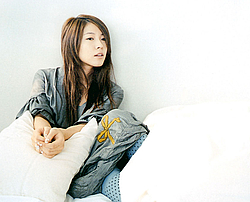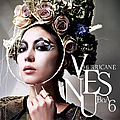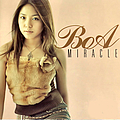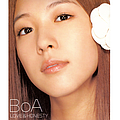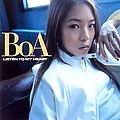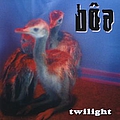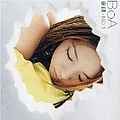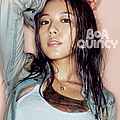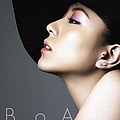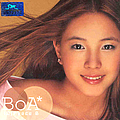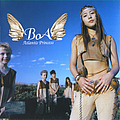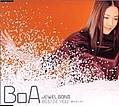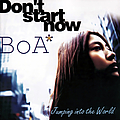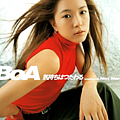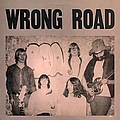Boa Biography
Boa is a name of, at least, five artists: 1. BoA is a South Korean singer 2. Boa was a 70s rock band 3. Boa is a Croatian art rock band 4. Boa is a Chilean power groove metal band 5. Boa is a Czech rock band 1) A mononym of South Korean singer Kwon Boa / 권보아 [Ko] (b. 5 Nov 1986, in Gyeonggi-do, South Korea) - a backronym of 'Beat of Angel' (active in South Korea, Japan & USA). She was discovered by SM Entertainment talent agents, when she accompanied her older brother to a talent search. In 1998, she signed to SM Entertainment & after two years of training, débuted with “ID; Peace B” ('00). Two years later, she released her Japanese début album, “Listen To My Heart” (Avex Trax). Her USA début was, the single, “Eat You Up” (14 Oct '08, SM Entertainment USA), followed by an English-language début album, “BoA” (17 Mar '09). Influenced by hip-hop & rnb singers - such as Nelly & Janet Jackson - many of Boa’s songs fall into those genres. As the singer feels she does not “have any talent for writing [songs]”, the writing and composition of her songs are handled mostly by her staff; for this reason, she has drawn some criticism. (Though only a few of her songs are self-written, BoA began composing on her own with her Japanese début album LISTEN TO MY HEART, in which she co-wrote and composed the song “Nothing’s gonna change”.) Boa’s multilingual skills (she speaks Japanese and conversational English along with her native Korean and has recorded songs in Mandarin Chinese) have contributed to her commercial success in South Korea and Japan and her popularity throughout East Asia. She is the only non-Japanese Asian to have two million-selling albums in Japan and is one of only two artists to have six consecutive number-one studio albums on the Oricon charts since her début. 2000-02 - Debut: At age eleven, BoA accompanied her older brother to an SM Entertainment talent search. Though her brother was the one who auditioned, SM talent scouts instead took notice of BoA and offered her a contract. Her parents initially opposed the notion of BoA’s leaving school to enter the entertainment business but eventually consented at her brother’s persuasion. BoA underwent two years of training (involving vocal, dance, and Japanese lessons), and at the age of thirteen released her début album ID; Peace B in South Korea on August 25, 2000. The album was moderately successful; it entered the Top 10 of the South Korean charts and sold around 156,000 units. Meanwhile, her Korean record label, SM Entertainment, made arrangements with Japanese label Avex Trax to launch her music career in Japan. In early 2001, BoA released her first mini-album, Don’t Start Now; it sold around 90,000 units. After its release, she took a hiatus from the Korean music industry to focus on the Japanese market at which time she worked to solidify her skills in Japanese. BoA began her Japanese music career singing at the Avex-owned club Velfarre. In 2001, she released her début Japanese single, a Japanese version of the song, “ID; Peace B” (originally from the eponymous album). The single reached #20 on the Oricon chart and was followed by “Amazing Kiss”, “Kimochi wa Tsutawaru” (気持ちはつたわる), and “LISTEN TO MY HEART”; the last became the singer’s first single to enter the Oricon’s Top Five. After the September 11, 2001 attacks, BoA recorded the charity single “The Meaning of Peace” with Kumi Koda (倖田來未) as part of Avex’s Song Nation project to raise funds for charity. Her début Japanese album, LISTEN TO MY HEART, was released on March 13, 2002. The album was a breakthrough in BoA’s career: it became an RIAJ-certified million-seller and debuted atop the Oricon, making it the first album by a Korean artist to reach the top. A single, “Every Heart: Minna no Kimochi” (Every Heart -ミンナノキモチ-), was released on the same day as the album. After the release of Listen to My Heart, BoA released her second Korean studio album, NO.1, a month later. The album sold around 544,000 units and became the fourth-best-selling record of the year in South Korea. Jumping into the World (a Japanese re-release of the mini-album Don’t Start Now) and the Japanese single “Don’t Start Now” were released a month later on the same day. 2003-05 - Commercial Success: BoA then released her seventh single “VALENTI”. It became a Top Five single for the artist, peaking at the number-two position on the Oricon. BoA released two more singles “Kiseki / No.1” and “Jewel Song / Beside You: Boku o Yobu Koe”, both which also peaked at the number-three position. At the end of the year, BoA released her second Korean mini-album Miracle. BoA’s second Japanese studio album, VALENTI (2003), became her best-selling album, with over 1,249,000 copies sold. In support of the album, BoA launched BoA 1st Live Tour Valenti, her first Japanese concert tour. Later that year, she released two Korean albums, Atlantis Princess and the mini-album Shine We Are!. The former was the fifth-best-selling South Korean record of the year with around 345,000 units sold; the latter sold around 58,000 units and was the fifty-second-best-selling record. Her third Japanese studio album, LOVE & HONESTY (2004) was a musical “change in direction”: it contained a rock-dance song (“Rock With You”) and “harder” R&B. Though the album failed to match Valenti in sales, it topped the Oricon chart for two weeks and became RIAJ-certified triple-platinum. In support of the album, BoA held a tour, Live Concert Tour 2004: Love & Honesty. In contrast with 1st Live Tour, which “emphasized exotic Asian design”, the Love & Honesty tour had an “outer-space, sci-fi” theme; among the props were a three-story-high space ship and the robot Asimo. The tour, which started in Saitama and ended in Yokohama, spanned nine performances and attracted about 105,000 attendants. Her first compilation album, BEST OF SOUL (2005), however, sold over a million copies, making BoA the first non-Japanese Asian singer to have two million-selling albums in Japan. BoA reinvented her image on her fourth Korean album, My Name (2004); she left the “cute” and “youthful” style that had characterized earlier years and presented herself as “sexy” and “sultry”. The album was the beginning of a foray into the Chinese market and contained two songs sung in Mandarin Chinese.The sales of BoA’s Korean albums began to decline: the album sold 191,000 units and became the eleventh-best-selling South Korean album of the year. Her fifth Korean album, Girls on Top, continued her image change. The album portrayed the singer as more “mature and self-confident” and was a “declaration of war on male chauvinism”; the “bohemian” look of the cover photograph represented “freedom and depth”, while music videos and album photographs that portrayed BoA in traditional Korean dress brought the “idea of Korean womanhood” into her music. The album also continued BoA’s foray into the Chinese market and, like the previous album, contained Mandarin Chinese songs. The album sold less than the previous album; it was the fourteenth-best-selling record of the year in South Korea with 113,000 units sold. 2006-08 - Sales Decline: In 2006, BoA was mostly inactive in South Korea as she focused her attention on Japan; however, on September 21, 2006, she released her first digital single in Korea, a Korean version of “KEY OF HEART”. Her fourth Japanese studio album, OUTGROW, was released on February 15, 2006. The limited CD+DVD edition of the album contained music videos of the album’s singles and a password to access a special version of the official website. The album reached the number-one spot on the Oricon chart for its first week of release, making it her fourth consecutive Japanese album to do so. It had low début sales, however; with 220,000 copies sold, it became her lowest-selling first-week début for a studio album at that point. “DO THE MOTION”, the first single from the album, reached the top spot, making her the fourth non-Japanese Asian to have a number-one single on the Oricon charts. “Merry Christmas from BoA” (2005), the album’s last single, was the singer’s first digital single. In support of Outgrow, BoA launched a special Zepp tour, B0A The Live, on September 29, 2006. The tour, which lasted until October 29, started from Nagoya and contained twelve shows, two in each of the following cities: Nagoya, Fukuoka, Osaka, Tokyo, Sendai, and Sapporo. She staged her first Christmas concert on December 7, 2006. BoA’s fifth Japanese studio album, MADE IN TWENTY (20) (2007), continued her transition from a “teenage girl” image to a more mature image. The album, which contained R&B and dance songs as well as ballads, debuted at the top of the weekly Oricon charts, making the album her sixth in a row to do so. She began using a personal computer for composing one of the songs (“no more make me sick”). On March 31, 2007, she launched a nationwide tour of Japan in support of the album. The tour, which sold about 70,000 tickets, was, according to BoA, “the biggest concert” she had ever given. Two tracks from the singles of Made in Twenty (20) were used as theme songs; “Your Color”, from the single “Nanairo no Ashita: Brand New Beat / Your Color” (2006), was used as the ending theme song for the Japanese release of the Xbox 360 game Ninety-Nine Nights. “Key of Heart”, from the single “Key of Heart / Dotch” (2006), was the ending theme for the Japanese release of the movie Over the Hedge. She also released an English version of “Key of Heart”, which was only available on the first press edition of the single. Later in 2007, Anycall (a Samsung brand) signed BoA, Xiah (of TVXQ), Tablo (of Epik High), and jazz pianist Jin Bora onto “
Top Boa Lyrics
| Title | |
|---|---|
| 1 | Game lyrics |
| 2 | Hurricane Venus lyrics |
| 3 | Atlantis Princess lyrics |
| 4 | The Shadow lyrics |
| 5 | Share Your Heart lyrics |
| 6 | Always lyrics |
| 7 | Bump Bump Bump lyrics |
| 8 | Duvet lyrics |
| 9 | Winter Love lyrics |
| 10 | Feel Me lyrics |
Write a comment
What do you think about Boa? Let us know in the comments below!
